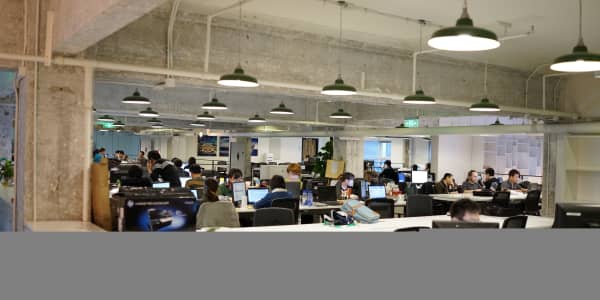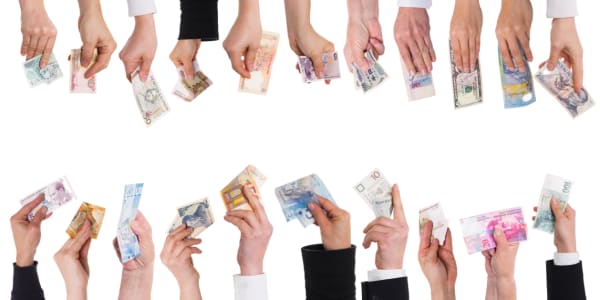In the latest stage of its years-long battle with Samsung, Apple accused its South Korean rival of copying ideas – and claimed damages of $2 billion for the alleged infringement.
The fight between the companies, which are both attempting to defend their own technology and products, has seen Samsung ordered to pay the U.S. tech giant $929 million in damages to date.
This figure would likely strike fear into even the most well-established of technology companies, but most tech start-ups are in a much more vulnerable position.
Without the legal firepower – and spare cash – to defend their technology, what can they do to protect years of hard work? To get their product noticed, companies need to be transparent about what they do – but this opens them to the threat of the "cloner."
When Nick Marsh co-founded software development company Makeshift, for example, he made a conscious effort to be as open as possible about the company's products, which are developed for use by other start-ups.
Read MoreYou earn how much?! Breaking the workplace taboo
"Telling the story of what we're doing is our best form of marketing –it's how we got our first customers," he told CNBC. "I guess the question is how much to give away. We probably give away more than most."
Marsh and his co-founders set up a blog in which they detailed everything from financial information to business plans. It was as a result of this that Makeshift became a victim of copying.
"Someone came to an event and totally ripped off one of our ideas," he said. "It annoyed us… but it's an inevitable part of business on the web."
Clone factories
Being "ripped off" is becoming an increasingly common problem for tech companies. There are, in fact, some outfits that appear to specialize in copying a start-up's ideas – so-called "clone factories."
Germany-based Rocket Internet, a venture capital firm and incubator, is infamous for replicating business plans and launching them in new markets in super-quick time. And it is not alone, with cloning companies dotted across the world.
Sometimes, the cloned companies are even bought by the business behind the original idea.
In 1999, brothers and Rocket Internet founders Alexander, Marc and Oliver Samwer sold their German online-auction site Alando to eBay for a reported $50 million – just three months after its launch. And in 2010, Samwer-backed voucher site CityDeal was bought by Groupon six months after its launch for cash and stock worth a reported $126 million.
Read MoreWhy crowdfunding for start-ups could be a huge mess
"We focus on proven business models since we believe to have an idea is one thing, the successful execution of an idea is a completely different thing," Andreas Winiarski, Rocket Internet's spokesman, told CNBC in an emailed statement. "The great idea without the right execution is worthless."
Respect… and disrespect
Perhaps unsurprisingly, the start-up sphere has something of a love-hate relationship with cloning companies.
"They're respected because they take the ideas and they execute them well. They are operational machines," Jason Baptiste, CEO of publishing platform Onswipe and author of "The Ultralight Startup," told CNBC.
"But they're disrespected because they're completely ripping it off - from the ideas, to the colors and design. It's basically cheating."
Despite the risk of being copied, start-ups are continuing to shun legal protection in favor of the exposure that transparency brings – and even potential future investors aren't concerned.
"In an efficient market, you will always see some of this happening," Andreas Stavropoulos, partner at DFJ venture capital firm, told CNBC.
Legal headaches
In fact, it's quite difficult for start-ups to get legal protection, with copyright, trademarks and patents hard to apply to many small businesses.

Copyright, for example, covers artistic creations like books or music, but cannot protect ideas themselves. Patents, meanwhile, only protect physical inventions - not ideas – and can cost tens of thousands of dollars.
"It can be difficult to get a patent for something which is simply a concept, unless there's a technological application of it," Mark Owen, a partner in law firm Taylor Wessing's trademarks, copyright and media team, told CNBC.
As such, Owen urged new businesses to keep things under wraps for as long as possible. But after launch date, it becomes a lot harder.
Read MoreInside Europe's wannabe Silicon Valleys
"At that point, you need to run as fast as you can. The first-mover advantage really is true and it leads you to have a brand position that's defensible," he said.
'Can't steal your road map'
Given the high-profile attention given to Apple vs Samsung's legal battle, it is perhaps surprising that companies can't do more to protect their ideas.
But veteran investor Stavropoulos, who specializes in start-ups, was unfazed.
"If you've been around as long as I have, you see the same ideas surfacing over and over again every five years or so," he said. "If we were to reject founders coming to us with ideas we've seen before, we'd be missing huge opportunities."
Perhaps this goes some way to explaining why both Baptiste and Marsh are so confident that transparency trumps secrecy.
"They can steal your ideas but they can't steal your road map – the values and reasons behind your ideas," Baptiste insisted. "And it's a start-up's road map that's important."





